14 start with H start with H

Henry Adams sought, late in life, to thwart prospective biographers by writing his own biography. Published soon after his death in 1918, The Education of Henry Adams was rightly greeted as a masterpiece. Not until thirty years later, with the appearance of the first volume of Ernest Samuels’s biography, did it become apparent how much the story had been colored by Adams’s singular philosophy of history and how great was the disparity between the protagonist of the Education and Adams as he actually was. Upon its completion in 1964, Samuels’s life of Henry Adams was hailed as “one of the great biographical achievements of our time”; its laurels included a Pulitzer Prize.
Ernest Samuels has now distilled his ample narrative into a single absorbing volume. We see Adams as a lively undergraduate, in contrast to the jaded young man of the Education; as budding writer, newspaper correspondent, eager participant in political maneuverings in Washington and at the American embassy in London; as teacher at Harvard and editor of the North American Review; settled in Washington, as scholar, biographer, historian, novelist; as insatiable traveler; as friend and adviser to statesmen; as elderly cosmopolite spending half of each year abroad; and always as witty chronicler of the social scene and trenchant commentator on the events of his time. We are drawn into the personal drama of Adams’s middle years: his married life with Clover; the halcyon period in Washington in the early 1880s, catastrophically terminated by Clover’s depression and suicide; his growing passion for Elizabeth Cameron; and his flight to the South Seas. Throughout the book we follow the genesis and progress of his writings, from his muck-raking journalism in President Grant’s Washington, through the social and political criticism of his novels, his biographies, and his great History, to the classic Mont Saint Michel and Chartres, the daring theories of the Education, and his last essays.
Few biographies have so broad a canvas—sixty years of American political, social, and intellectual life, from the pre–Civil War years to the First World War. And few offer so revealing a portrait of a complex human being and an extraordinary career.

Henry Adams - American Writers 93 was first published in 1971. Minnesota Archive Editions uses digital technology to make long-unavailable books once again accessible, and are published unaltered from the original University of Minnesota Press editions.

Henry Adams has been called an indispensable figure in American thought. Although he famously “took his own life” in the autobiographical Education of Henry Adams, his letters—more intimate and unbuttoned, though hardly unselfconscious—are themselves indispensable for an understanding of the man and his times.
This selection, the first based on the authoritative 6-volume Letters, represents every major private and public event in Adams’s life from 1858 to 1918 and confirms his reputation as one of the greatest letter writers of his time. Adams knew everyone who was anyone and went almost everywhere, and—true to the Adams family tradition—recorded it all. These letters to an array of correspondents from American presidents to Henry James to 5-year-old honorary nieces reveal Adams’s passion for politics and disdain for politicians, his snobbish delight in society and sincere affection for friends, his pose of dilettantism and his serious ambitions as writer and historian, his devastation at his wife’s suicide and his acquiescence in the role of Elizabeth Cameron’s “tame cat,” his wicked humor at others’ expense and his own reflexive self-depreciation.
This volume allows the reader to experience 19th-century America through the eyes of an observer on whom very little was lost, and to make the acquaintance of one of the more interesting personalities in American letters. As Ernest Samuels says in his introduction, “The letters lift the veil of old-age disenchantment that obscures the Education and exhibit Adams as perhaps the most brilliant letter writer of his time. What most engages one in the long course of his correspondence is the tireless range of his intellectual curiosity, his passionate effort to understand the politics, the science, and the human society of the world as it changed around him… It is as literature of a high order that his letters can finally be read.”
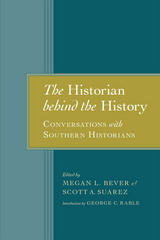
The historians and their main topics include:
Richard J. M. Blackett on antebellum and African American history
Dan T. Carter on Reconstruction, Civil Rights, and George Wallace
Pete Daniel on the New Deal and the Cold War South
Laura F. Edwards on the Early Republic, the Civil War, Reconstruction, and women’s history
William W. Freehling on the antebellum South
Gary W. Gallagher on the Civil War
Glenda Elizabeth Gilmore on Jim Crow
James M. McPherson on the Civil War
Theodore Rosengarten on the Depression
J. Mills Thornton III on the antebellum South
In his introduction, award-winning author and historian George C. Rable draws together the multifaceted themes of these interviews, offering a compelling overview of the nature of the field. Edited by Megan L. Bever and Scott A. Suarez, The Historian behind the History offers critical insights about the craft and professional life of the historian.
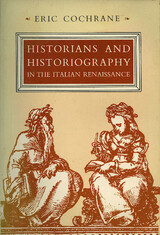
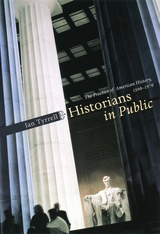
Tyrrell's elegant history of the practice of American history traces debates, beginning shortly after the profession's emergence in American academia, about history's role in school curricula. He also examines the use of historians in and by the government and whether historians should utilize mass media such as film and radio to influence the general public. As Historians in Public shows, the utility of history is a distinctive theme throughout the history of the discipline, as is the attempt to be responsive to public issues among pressure groups.
A superb examination of the practice of American history since the turn of the century, Historians in Public uncovers the often tangled ways history-makers make history-both as artisans and as actors.

Historians on Hamilton brings together a collection of top scholars to explain the Hamilton phenomenon and explore what it might mean for our understanding of America’s history. The contributors examine what the musical got right, what it got wrong, and why it matters. Does Hamilton’s hip-hop take on the Founding Fathers misrepresent our nation’s past, or does it offer a bold positive vision for our nation’s future? Can a musical so unabashedly contemporary and deliberately anachronistic still communicate historical truths about American culture and politics? And is Hamilton as revolutionary as its creators and many commentators claim?
Perfect for students, teachers, theatre fans, hip-hop heads, and history buffs alike, these short and lively essays examine why Hamilton became an Obama-era sensation and consider its continued relevance in the age of Trump. Whether you are a fan or a skeptic, you will come away from this collection with a new appreciation for the meaning and importance of the Hamilton phenomenon.
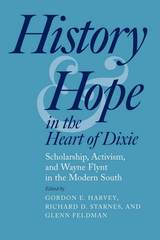
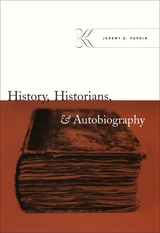
Drawing on the theoretical work of contemporary critics of autobiography and the philosophy of Paul Ricoeur, Popkin reads the autobiographical classics of Edward Gibbon and Henry Adams and the memoirs of contemporary historians such as Emmanuel Le Roy Ladurie, Peter Gay, Jill Ker Conway, and many others, he reveals the contributions historians' life stories make to our understanding of the human experience. Historians' autobiographies, he shows, reveal how scholars arrive at their vocations, the difficulties of writing about modern professional life, and the ways in which personal stories can add to our understanding of historical events such as war, political movements, and the traumas of the Holocaust.
An engrossing overview of the way historians view themselves and their profession, this work will be of interest to readers concerned with the ways in which we understand the past, as well as anyone interested in the art of life-writing.
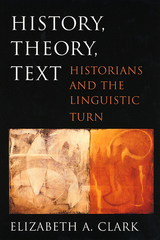
In this work of sweeping erudition, one of our foremost historians of early Christianity considers a variety of theoretical critiques to examine the problems and opportunities posed by the ways in which history is written. Elizabeth Clark argues forcefully for a renewal of the study of premodern Western history through engagement with the kinds of critical methods that have transformed other humanities disciplines in recent decades.
History, Theory, Text provides a user-friendly survey of crucial developments in nineteenth- and twentieth-century debates surrounding history, philosophy, and critical theory. Beginning with the "noble dream" of "history as it really was" in the works of Leopold von Ranke, Clark goes on to review Anglo-American philosophies of history, schools of twentieth-century historiography, structuralism, the debate over narrative history, the changing fate of the history of ideas, and the impact of interpretive anthropology and literary theory on current historical scholarship. In a concluding chapter she offers some practical case studies to illustrate how attending to theoretical considerations can illuminate the study of premodernity.
Written with energy and clarity, History, Theory, Text is a clarion call to historians for richer and more imaginative use of contemporary theory.
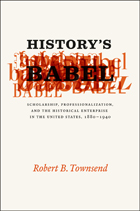

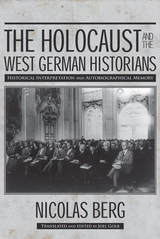
This English-language translation is also a shortened and reorganized edition, which includes a new introduction by Berg reviewing and commenting on the response to the German editions. Notably, in this American edition, discussion of historian Joseph Wulf and his colleague and fellow Holocaust survivor Léon Poliakov has been united in one chapter. And special care has been taken to make clear to English speakers the questions raised about German historiographical writing. Translator Joel Golb comments, "From 1945 to the present, the way historians have approached the Holocaust has posed deep-reaching problems regarding choice of language. . . . This book is consequently as much about language as it is about facts."
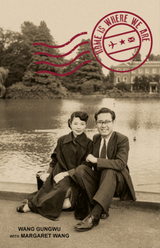
Wang Gungwu’s account of his university education in Singapore and the UK, and the early years of his career as an academic in Malaysia captures the excitement, the ambition, and the choices of a generation that saw it their responsibility to build the new nations of Southeast Asia.
The exploration of the emotional and intellectual journey towards the formation of an identity, treasured by readers of Wang's Home Is Not Here, extends in this volume into an appreciation of love, family life, and the life of the mind. We also see these years from Margaret’s perspective, her own fascinating family story, and her early impressions of this young bearded poet. Wise and moving, this is a fascinating reflection on identity and belonging, and on the ability of the individual to find a place amidst the historical currents that have shaped Asia.
READERS
Browse our collection.
PUBLISHERS
See BiblioVault's publisher services.
STUDENT SERVICES
Files for college accessibility offices.
UChicago Accessibility Resources
home | accessibility | search | about | contact us
BiblioVault ® 2001 - 2024
The University of Chicago Press









